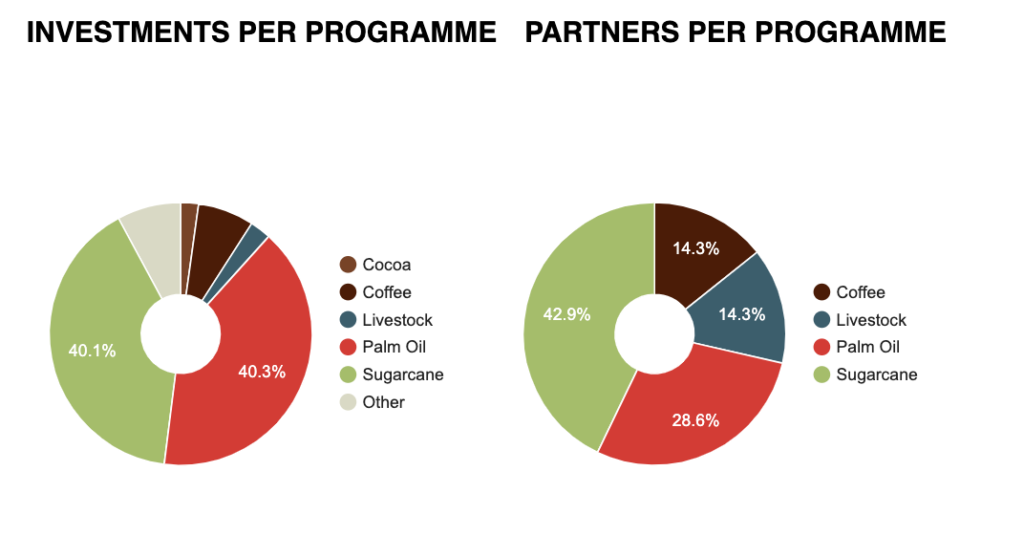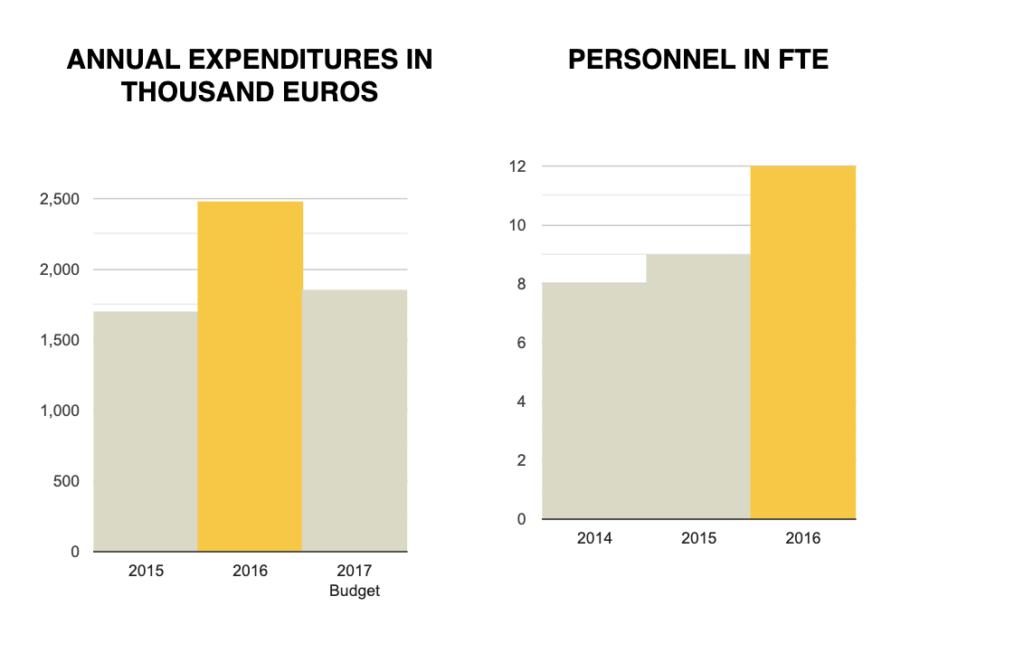The cocoa programme focused on climate-smart agriculture and promoted the use of ICT to monitor and provide social, environmental and management performance information to farmers. A carbon balance tool was developed for diversified production systems which include cocoa, forest and livestock to monitor the carbon footprint of farmers. A continual improvement methodology for farmers using the Rural Horizon self-assessment tool is being integrated into the programme.

Two flagship projects of Solidaridad´s coffee programme finalized their first phase in 2016: the BACK to REDD+ project in Peru and Colombia and the Sustainable Trade Platform in Colombia. The BACK to REDD+ project proved the feasibility of producing more coffee with a lower environmental footprint. The use of the Cool Farm Tool to measure GHG emissions of production systems moved coffee producers closer to selling carbon credits via Gold Standard verification.

Based on a diagnosis of smallholder cotton production in two traditional cotton regions in Brazil, a successful pilot project was completed with support from the C&A Foundation. Solidaridad developed a model of smallholder cotton production capable of improving the productivity and income of producers, valuing the means of production such as soil, water and inputs. It also integrated systems that are sustainable and resilient to climate change.

The main achievement is the development of sector collaboration in Colombia, Ecuador and Peru in which Solidaridad played a pivotal role. In addition, the self-assessment tool Rural Horizons was adapted for citrus production together with the producers’ cooperative Citri. Sector engagement with brands on the market side and farmers and producers on the supply side led to the development of a plan to support 4,400 farmers who produce 10% of the world’s orange juice.

Solidaridad expanded its policy work into Bolivia by establishing policy dialogues with federations of small-scale miners and the government. Current policies in Bolivia prevent the broader uptake of responsible practices, so these dialogues are urgently needed. They will have a special focus on formalization and gender. Solidaridad is also developing the PIM online platform for information exchange about small-scale mining in the Andes region, with the near-term goal of including local legislation for Peru, Colombia, Ecuador and Bolivia.

In the Amazon, the region with the world’s largest remaining tropical forest, Solidaridad and its partners initiated the “Program for Promoting Low Carbon Smallholder Business” in the State of Para, with a pilot project in the municipality of Novo Repartimento. In Paraguay, Solidaridad and the Rural Association from Paraguay joined together to engage 287 beef farmers in the Chaco areas with in total 743,814 head of cattle over 965,888 hectares.

Under the Sustainable Trade Platform (STP), an initiative led by Solidaridad in Colombia, producers representing 40% of Colombia’s national palm oil production committed to sustainable production according to the RSPO standard. During the year, 2,575 hectares came under sustainable management and 123,212 tons of palm oil produced by five companies was RSPO certified, of which 23,723 are from a new company certified in 2016.

In the biggest supplying countries of soy in Latin America, a strong focus was put into shifting from direct producer support to landscape and advocacy for change management. Projects showed that given the right incentives, soy producers are willing and able to provide certified soy under the highest requirements, like those in the RTRS Standard. However, what was learned is that the momentum created wasn´t enough to mitigate on-going issues.

By consolidating partnerships with mills and farm associations, Solidaridad is recognized as a respected NGO working in the sugarcane sector in this region.The continual improvement projects designed in partnership with stakeholders have been disseminated far and wide and are starting to deliver results in the field. The programme also expanded to Colombia and now supports 28 mills, two farmer associations (Socicana & Procana) and 2,200 farmers in this region.

Development of a sustainable supply chain for yerba mate started in 2015 and continues to promote the adoption of good agricultural practices for the production of yerba mate. Yerba mate producer support is key to the programme and is achieved through trainings and technical advice to cooperatives. As part of the social scope, Solidaridad also supported small producers to improve their livelihood who were not associated with the cooperative.

DEVELOPMENTS
Two regional learning and exchange platforms launched in 2016 and experienced rapid growth with the participation of supply chain actors from all countries in the region. The MesoAmerican Palm Oil Alliance (MAPA), a sustainable palm oil platform, and PanAmericaña (PanAm), a sustainable sugar platform, share the following characteristics:
- Scale and speed: MAPA and PanAm incorporate knowledge in platforms for producer-to-producer exchanges at both national and regional levels, as well as knowledge exchange via virtual platforms (to launch Q2 2017). These will function as information and learning centres for mills, extraction plants and producers to close the gaps between Bonsucro and RSPO certification. The platforms also extend efforts to the continental level with respect to sharing tools and implementing best practices and innovations beyond Mesoamerica.
- Both initiatives are characterized by heavy market involvement.
- With unparalleled high levels of industry participation, Mesoamerica has the potential for recognition as the “go-to region” for sustainably-produced palm oil and sugar.
The groundwork was laid to build regional coffee, cocoa and livestock learning and exchange platforms for launch in 2017.
In addition, Solidaridad’s work moved beyond industry and farm with the launch of two sustainable landscapes initiatives in the Zona Litoral del Norte in Honduras, and Region Autonomo del Caribe Sur in Nicaragua.

ACHIEVEMENTS
PanAmericaña private sector participation grew from 2 to 17 mills in 2016, with numerous other organizations such as CNIAA, CNC, CNPR and regional sugar associations displaying a keen interest in joining this unprecedented initiative in the region.
After four years of engagement with the Honduran and Guatemala palm oil sector, MAPA grew to include 100% of the Nicaraguan palm oil sector and a significant portion of the Mexican sector. A particular focus on establishing farmer field schools, and achieving economy of scale through the Paisajes Sostenbiles (PaSos) initiative in Northern Honduras, show great promise for bolstering improvement and sustainability of smallholder productivity, as well as bridging the RSPO certification gap.
The launch of PaSos is driving progress and national commitment to a jurisdictional RSPO certification approach in Honduras and Nicaragua, and is generating new opportunities for blended finance and impact investment for inclusive supply chains in palm oil, livestock and cocoa.
A comprehensive gender analysis of multiple supply chains (sugar, palm oil, livestock, cocoa and coffee) across the región was conducted in 2016. The in-depth assessment created the foundation for the development of training programmes and the design of interventions to integrate gender equity policies and practices for all of Solidaridad’s private sector and producer organization partners.

PARTNERSHIPS
Solidaridad continued to grow in collaboration with industry, producer associations and other stakeholders such as government, research institutions, chambers of commerce and civil society organizations. Solidaridad also maintained strategic partnerships with WWF and SNV. An exciting new partnership with EcoAgriculture Partners will transfer knowledge and tools on integrated landscapes to our regional programmes, while contributing to a growing body of research on socio-economic and environmental impacts of a landscape approach.
The Dutch Ministry of Foreign Affairs continues to be the most important donor in the region, and Solidaridad is working with the embassy to strengthen collaboration amongst the 12 strategic partners under the Dutch ministry’s “Dialogue and Dissent” strategy.
Led by Henkel’s robust investment in MAPA, other market actors are joining forces with Solidaridad to accelerate sector transformation. Coca-Cola, Pepsico and Mars demonstrated an intense interest in PanAmericaña, while Starbucks and Louis Dreyfus will support the scaling up of Solidaridad’s climate-smart coffee programme in Mexico with expected replication across the región.
Increasingly, Solidaridad is a sought-after partner due to its unique supply chain focus that spans five strategic dimensions of development: producer support for best practice implementation, robust infrastructure for scale and speed, sustainable landscapes for multiple benefits beyond the farm, national level for policy influencing, and the market for incentives and investment.
ORGANIZATION
Solidaridad established a formal legal presence in Honduras and advanced with a legal presence in Nicaragua and Mexico. In response to growing demand, several new members were brought into the regional team for programme management, development and communications, and to bring industry-insider expertise to both MAPA and PanAmericaña. The growth curve will continue into 2017 with an expected increase from eight staff members in early 2016 to 24 by mid-2017.
In October 2016, the Central American and Mexican team hosted Solidaridad’s bi-annual Executive Board of Directors meeting in Antigua, Guatemala. In addition to a learning journey to the Las Palmas on the south coast, regional partners gathered to share insights at the “Change that Matters: Innovation and Sustainability in Mesoamerica”. Speakers included Ambassador Peter-Derrek Hof, of the Dutch embassy in Costa Rica, Jorge Quezada, MARN El Salvador, Sara Scherr, EcoAgriculture Partners, Bernardo Roehrs, Agroamerica-Guatemala, Max Camiro, CNIAA, and Nico Roozen, Solidaridad’s executive director.
Team meetings in 2016 focused on 2016-2020 regional strategies for integrated and synergistic programming, and a three-day workshop on sustainable landscapes with EcoAgriculture Partners. As always, the meetings provide a great opportunity for team building and knowledge sharing.
Total income in 2016 was €1,739,993. Primary donors were the Dutch Postcode Lottery and the Dutch Ministry of Foreign Affairs.
